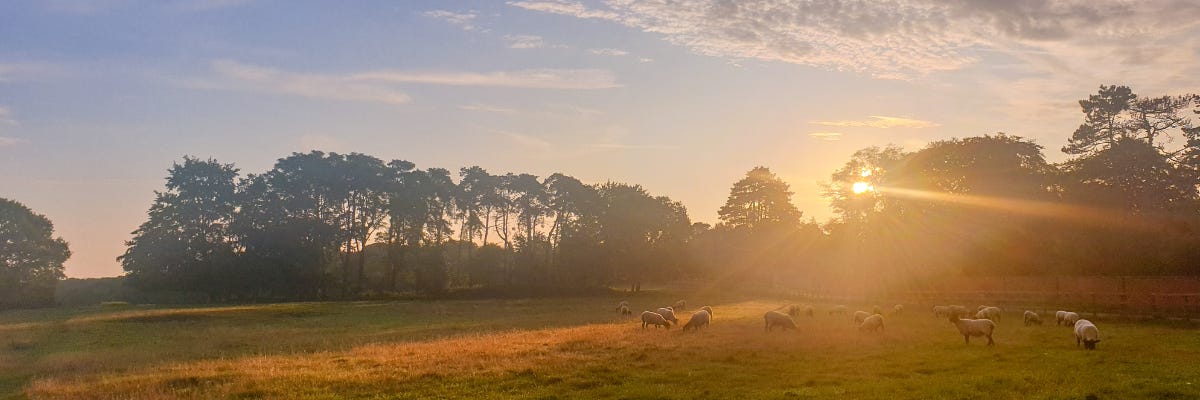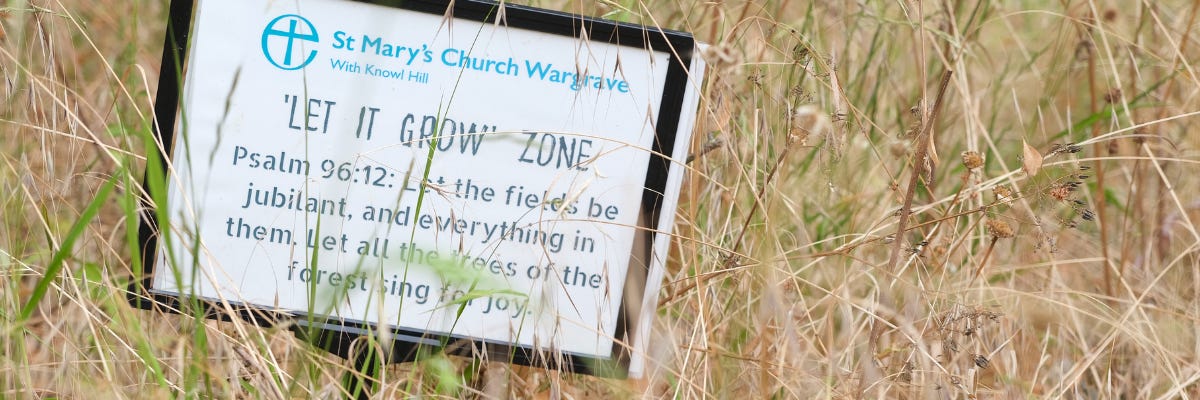Chaos theory
How to order and re-order a community or team
Prefer audio? Listen to Bishop Steven’s podcast on Spotify.
“In the beginning when God created the heavens and the earth, the earth was a formless void and darkness covered the face of the deep, while a wind from God swept over the face of the waters”
Genesis 1.1-2
An organisation in crisis
Leadership is always demanding but some leadership roles do feel routine and straightforward. The organisation is running well. The vision is clear. There are no storms in view. The task from year to year is to go on doing what you are doing and to make incremental improvements.
Other roles may feel more demanding than this. Everyone acknowledges there are serious issues to address. There is a need for root and branch review, but at least the overall direction is clear and some parts are working.
But other leadership tasks feel much more testing. The organisation is in crisis. There are no resources. The wrong people are in the wrong kinds of roles. You are one wrong turn away from disaster. To use that well-known biblical image, the writing is on the wall. So many problems face the leaders, it is hard to know where to begin.
This kind of diagnosis can apply to a local authority department, a hospital, a school, a charity or a church. Where should Christian leaders turn for inspiration when faced with this kind of challenge?
The responsibility of a generation
The normal textbooks on leadership don’t give much space to how to lead when the very fabric of the organisation is falling apart. They are mostly concerned with incremental development or helping to make a good organisation better.
I suspect this is partly because most of them have emerged from reflections on leadership in a commercial context. An unprofitable company will simply disappear over time and another will take its place. Although the human consequences of that change will be difficult, the leadership challenge is clearer.
However, in the charitable sector or in the health service, in education or in the Church, these constraints do not apply.
If a medium-sized town is served by a single Further Education college, and that college is poorly governed and badly run, the town will be blighted for a generation. The person who is appointed to lead the college has to have the aim of turning things around, over time. The challenges are more real and much more demanding for the leader.
The same would be true in a GP surgery, a parish church, a failing primary school, or a hospice. A very large number of leaders will face this kind of situation over the course of their working lives. When it happens, where do you begin?
Let’s start at the very beginning
There are two accounts of the creation of the world in the early chapters of the Book of Genesis (and several others scattered through the Bible). Neither is meant as a detailed, literal and historical account of how the world was made. Both are affirming deep truths about the universe and about God’s work in creation. The first creation story in Genesis 1.1-2.4 has a great deal to teach us about leadership.
Genesis 1 is not an account of creation out of nothing. Rather, God is shaping and ordering the world. The place the story begins is not in the time when nothing existed at all. We need to read the first verses of John’s gospel for that perspective. Here the earth is a formless void. The Hebrew expression means ‘an expanse of nothingness’. Chaos. Take a moment to imagine what that chaos might have looked like: the earth without form and void.
The great symbol of chaos in the Bible (and in the ancient Near East) is water: the vast expanse of the sea. In the modern world we can have a romantic and positive view of the sea, but that was not so in the Bible. Wherever the sea occurs it is a symbol of chaos and darkness and death. Think of the flood story later in Genesis when creation is undone and destroyed. Think of the Red Sea or Jonah falling into the deep.
Principles of good order
In Genesis 1.1 God’s Spirit (the same word in Hebrew as ‘wind’) is brooding over the face of the waters. We are not told how long this brooding, hovering or sweeping over the waters took. But when the creation begins it is a story of bringing order out of chaos before anything new is made.
God brings order, first through separating out one thing from another. The light is separated from the darkness, and God names the light and darkness. God separates the sky from the earth and the dry ground from the sea and gives them names.
This principle of bringing good order continues through the creation story. There is a careful order to the creation of, first, plants, then fish and birds, and finally humankind as the pinnacle of creation. There is a careful delineation of time into days, and each day into the evening and the morning.
In contrast to our modern, Western view of time, the evening is the beginning of the day (when we rest and enjoy God’s creation) and the morning comes second (when we awake and join our work to what God is already doing). The high point of the creation story is the gift of the sabbath: the day of rest and reflection which gives meaning to the whole. God’s leadership is rooted in bringing fruitful order out of chaos.

The growth trajectory
If most of our models of leadership are drawn from the world of commerce and business, it is not perhaps surprising that they are dominated by images of growth and a desire for the organisation to become larger and more profitable. Projections and trajectories abound. The shaping question for leadership is how do I help this organisation to grow and become larger and more profitable?
These images and questions are helpful and necessary in many contexts. But in some, we need another set of questions and models to set alongside them.
In many different contexts, we should be striving not for growth but to bring fruitful order out of chaos.
This leadership task is much more like the work of God in Genesis 1.
As we will see, it has to do with a kind of holy and loving brooding over the face of the deep – facing and pondering the many different issues and questions which confront you. It has to do with discerning the right place to begin: the first problem to tackle which will help you tackle all the others. It has to do with separating out the dry land from the waters: finding places where there can be creative and fruitful development in the midst of a host of different problems. It has something to do with carrying the longer perspective: of understanding what you are trying to create, of the length of time it will take, of the value of persevering through the demanding early years of reconstruction until fruitful and creative growth begins again.
A need to brood
There are two key skills which leaders need in these situations. They are habits and dispositions of character, as well as skills.
The first is captured by the phrase:
“The Spirit of God brooded over the face of the deep”
Genesis 1.1 in the Authorised Version
Leaders faced with chaotic organisations need to brood.
The second is the ability to understand and to shape time creatively and well.
Brooding has several different strands of meaning.
It means first to have the patience and courage to dwell with and within the chaos, to explore the complexity and to attempt to understand the context well. This takes considerable courage and patience.
Leaders do well to remember that to every complex problem there is a simple solution - and it is nearly always wrong. It is vital for leaders to do everything they can to avoid giving the impression that now the right leader has arrived (themselves) sorting this mess out will be very straightforward. It takes time to understand a new situation really well and to live within it.

When to act
Second, to brood means to make the second vital step of taking time and space to think and reflect before acting. A leader who does not make time to reflect when addressing chaos will certainly be overwhelmed. We all reflect in a myriad different ways. However the capacity to journal, to discuss the situation with others, to take time away with a core team, to retreat will be absolutely vital in making progress.
Third, to brood means to love. The more difficult and challenging a situation, the more the people within it will need love and care and commitment from those entrusted with leadership. The English word ‘brood’ comes from the image of a hen sitting on a nest of eggs. Christians believe that God made the world in love. Love is a vital part of any kind of leadership, but especially leadership from chaos.
And fourth, brooding implies patience and discernment, not only about where to begin but also about when to act. We are not told how long the Spirit of God was brooding over the face of the waters but the implication is that this was not a matter of moments. There was a season of planning, reflection, preparation, before the decisive beginning was made. The greater the chaos, the harder it will be to wait. There may be a need to triage the problems and to deal with urgent, pressing issues rapidly. But the deeper, systemic work of brooding will need longer.
Managing time
The second great skill which leaders need when facing situations of chaos is one of the great subthemes of the chapter. An essential part of the act of bringing order from chaos is the ability to understand, to divide, to order and to manage time. A very significant number of leaders struggle most in our lives with the right ordering of time and energy.
Genesis 1 sets the very creation of the universe within a framework of the ordering of time, into night and day, evening and morning, and seven great “days” of creation. The last of them is, of course, the day of rest, reflection, review and recreation, the gift of Sabbath:
“So God blessed the seventh day and hallowed it, because on it God rested from all the work that he had done in creation”
Genesis 2.3
A time to rest
Leadership always involves the ordering of time for the leader themselves and, often, for other people. As a college principal thirty years ago, one of my most important tasks was drawing up and reflecting on the timetable. Should breakfast be before and after Morning Prayer? How long should we allow for lunch and coffee? Should certain days be kept clear and free for study or prayer? What are the principles and habits by which time needs to be ordered in healthy institutions?
The first, counter-cultural Christian insight is that rest should find an honoured place in the rhythm of the week, the day and the year. Human beings cannot work all the time. We become less than human if we attempt to do so (or if we attempt to make others do so).
Organisations and communities need rest, fallow periods, down time, for healing and mending and reflection and to be recreated. Leaders need to have an eye always to the work levels and pace of the communities we serve. The temptation will sometimes be to run too fast, rather than walk too slowly.
The Rule of Benedict
One of the most influential documents in the history of Western civilisation is the Rule of Benedict. The Rule has shaped not only monastic and church life but the life of universities and schools, hospitals and whole societies.
Much of the Rule is taken up with the proper ordering of time: the hours of the day, the days of the week and the seasons of the year. Benedict shapes time so that a community which follows the Rule gives the right time and priority to prayer, to rest and to work (in that order of priority).
Benedict is drawing on profound insights in creation. What were men and women made for? We were not made to be units of production, to work. We were created for friendship and relationship with God – to know and enjoy God for ever.

For everything there is a season
The second is that time needs to be ordered so that the right energy and attention is given to each element of the task over the course of a week, a month, a year. Not all times are the same. The created world has its seasons.
These seasons give a rhythm to the year. In John 15, Jesus implies in his picture of the vine, that the life of the Christian community and the disciple is also seasonal. Periods of great fruitfulness will alternate with a sense of being pruned and abiding more deeply in the vine.
A wise leader will constantly reflect on the way in which their own time is ordered and on the ordering of time in the community.
Is enough time being spent in nurturing the team, in tending the life of the community, in outward-facing activity? Are people able to rest and be replenished in the normal rhythms of the week? Is everything running just slightly too fast for people’s good? Or is there a need for more momentum and greater energy?
How can adjusting the timetable and the culture of the organisation impact the wellbeing of those who work within it and those whom the organisation serves?
What to do when it’s all too much
Leading in chaos and crisis can be incredibly demanding in the Church and in wider society. Coaching and mentoring are essential but so are the deep principles of leadership enshrined in creation.
When the leadership task overwhelms you, take time to brood deeply. Begin the work of ordering or re-ordering time for yourself and the teams you work with.
Over time, seek the solid ground, and see new life begin to appear, as you order a new creation.
Part two of The Gift of Leadership series. Adapted from Chapter 7 of The Gift of Leadership, Canterbury Press, 2016.



